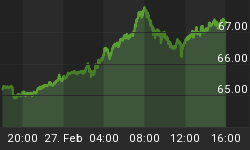Yet another central bank has announced a warning about the perils of deflation. Please consider China Central Bank Calls for Vigilance on Deflation.
China's central bank governor Zhou Xiaochuan warned on Sunday that the country needs to be vigilant for signs of deflation and said policymakers were closely watching slowing global economic growth and declining commodity prices.
Zhou's comments are likely to add to concerns that China is in danger of slipping into deflation and underline increasing nervousness among policymakers as the economy continues to lose momentum despite a raft of stimulus measures.
"Inflation in China is also declining. We need to have vigilance if this can go further to reach some sort of deflation or not," Zhou said at a high-level forum in Boao, on the southern Chinese island of Hainan.
Zhou added that the speed with which inflation was slowing was a "little too quick", though this was part of China's ongoing market readjustment and reforms.
Historical Perspective On CPI Deflations
In its March report, the BIS took a look at the Costs of Deflations: A Historical Perspective. Here are the key findings.
Concerns about deflation - falling prices of goods and services - are rooted in the view that it is very costly. We test the historical link bet ween output growth and deflation in a sample covering 140 years for up to 38 economies. The evidence suggests that this link is weak and derives largely from the Great Depression. But we find a stronger link between output growth and asset price deflations, particularly during postwar property price deflations. We fail to uncover evidence that high debt has so far raised the cost of goods and services price deflations, in so-called debt deflations. The most damaging interaction appears to be between property price deflations and private debt.
Deflation may actually boost output. Lower prices increase real incomes and wealth. And they may also make export goods more competitive.
Once we control for persistent asset price deflations and country-specific average changes in growth rates over the sample periods, persistent goods and services (CPI ) deflations do not appear to be linked in a statistically significant way with slower growth even in the interwar period. They are uniformly statistically insignificant except for the first post-peak year during the postwar era - where, however, deflation appears to usher in stronger output growth. By contrast, the link of both property and equity price deflations with output growth is always the expected one, and is consistently statistically significant.
Conclusions
The evidence from our long historical data set sheds new light on the costs of deflations. It raises questions about the prevailing view that goods and services price deflations, even if persistent, are always pernicious. It suggests that asset price deflations, and particularly house price deflations in the postwar era, have been more damaging. And it cautions against presuming that the interaction between debt and goods and services price deflation , as opposed to debt's interaction with property price deflations, has played a significant role in past episodes of economic weakness.
The exception to the general rule was the Great Depression but, that was also an asset bubble deflation coupled with consumer price deflation.
Meanwhile central banks on every continent are worried about something they should welcome.
Economic Challenge to Keynesians
Of all the widely believed but patently false economic beliefs is the absurd notion that falling consumer prices are bad for the economy and something must be done about them.
I have commented on this many times and have been vindicated not only by sound economic theory but also by actual historical examples.
My January 20, post Deflation Bonanza! (And the Fool's Mission to Stop It) has a good synopsis.
And my Challenge to Keynesians "Prove Rising Prices Provide an Overall Economic Benefit" has gone unanswered.
There is no answer because history and logic both show that concerns over consumer price deflation are seriously misplaced.
Worse yet, in their attempts to fight routine consumer price deflation, central bankers create very destructive asset bubbles that eventually collapse, setting off what they should fear - asset bubble deflations following a buildup a bank credit on inflated assets.















